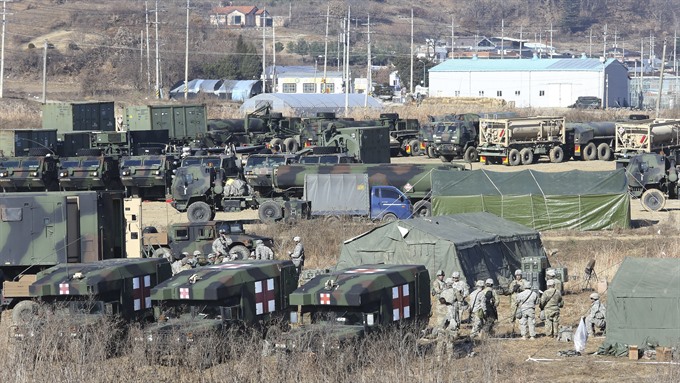 World
World

North Korean leader Kim Jong-Un conducted a large-scale artillery drill simulating an attack on the South Korean capital and other targets, as Seoul and Tokyo today unveiled fresh unilateral sanctions against Pyongyang over its nuclear weapons programme.
 |
| U.S. Army soldiers conduct the annual exercise in Yeoncheon, South Korea near the border with North Korea, Friday, Dec. 2, 2016. South Korea and Japan on Friday announced their own fresh, unilateral sanctions on North Korea as their nuclear-armed neighbor warns of retaliation against toughened U.N. sanctions over the nuclear and missile tests it conducted this year. —AP/VNA Photo |
SEOUL — North Korean leader Kim Jong-Un conducted a large-scale artillery drill simulating an attack on the South Korean capital and other targets, as Seoul and Tokyo today unveiled fresh unilateral sanctions against Pyongyang over its nuclear weapons programme.
The military exercise, involving multiple batteries of frontline heavy artillery units, targeted five border islands, as well as "reactionary ruling organs" in Seoul and other cities, the North’s official KCNA news Agency said.
It took place on Thursday, just hours after the UN Security Council unanimously adopted a new resolution imposing tough new sanctions on North Korea following its fifth nuclear test in September.
The UN resolution, which was spearheaded by the United States and came after three months of tough negotiations with fellow veto-wielding council member China, caps the North’s annual coal exports -- its top external revenue source.
"If a war breaks out, such a deadly strike should be inflicted upon the South Korean forces to completely break their will of counteraction at the start and make a clean sweep of them," KCNA quoted Kim Jong-Un as saying during the artillery drill.
"Nobody and nothing would survive," the young leader added.
South Korea today unveiled its own sanctions against Pyongyang, adding dozens of individuals and organisations to a blacklist of those suspected of involvement in the North’s nuclear programme.
Given the absence of any trade links or meaningful contact of any sort between the two Koreas, the South’s measures are largely symbolic, and more aimed at "raising awareness", senior government policy official Lee Suk-Joon said at a press briefing.
The expanded blacklist included the North’s ruling Workers’ Party of Korea and two of Kim’s closest aides, Choe Ryong-Hae and Hwang Pyong-So – additions clearly aimed at riling the leadership in Pyongyang.
South Korea also named the Chinese company Dandong Hongxiang Industrial Development, which was placed on a US sanctions blacklist in September for allegedly supporting the North’s nuclear programme.
It marks the first time Seoul has sanctioned a Chinese firm in connection with North Korea, although Lee noted that Dandong Hongxiang had no existing transactions with any South Korean company.
The US sanctions announcement had accused Dandong Hongxiang of making up a "key illicit network supporting North Korea’s weapons proliferation".
Japan also signalled a toughening of its unilateral sanctions, expanding a ban on port calls by vessels that had visited North Korea, and new additions to its own sanctions blacklist of North Korean individuals and entities.
North Korea has conducted two nuclear tests so far this year. With the fifth test, it claimed major strides in its efforts to fit a miniaturised warhead on a missile that could reach the United States.
Wednesday’s UN Security Council resolution demanded that North Korea "abandon" its nuclear weapons programme, but Pyongyang said the sanctions would only trigger "tougher countermeasures for self-defence". — AFP




